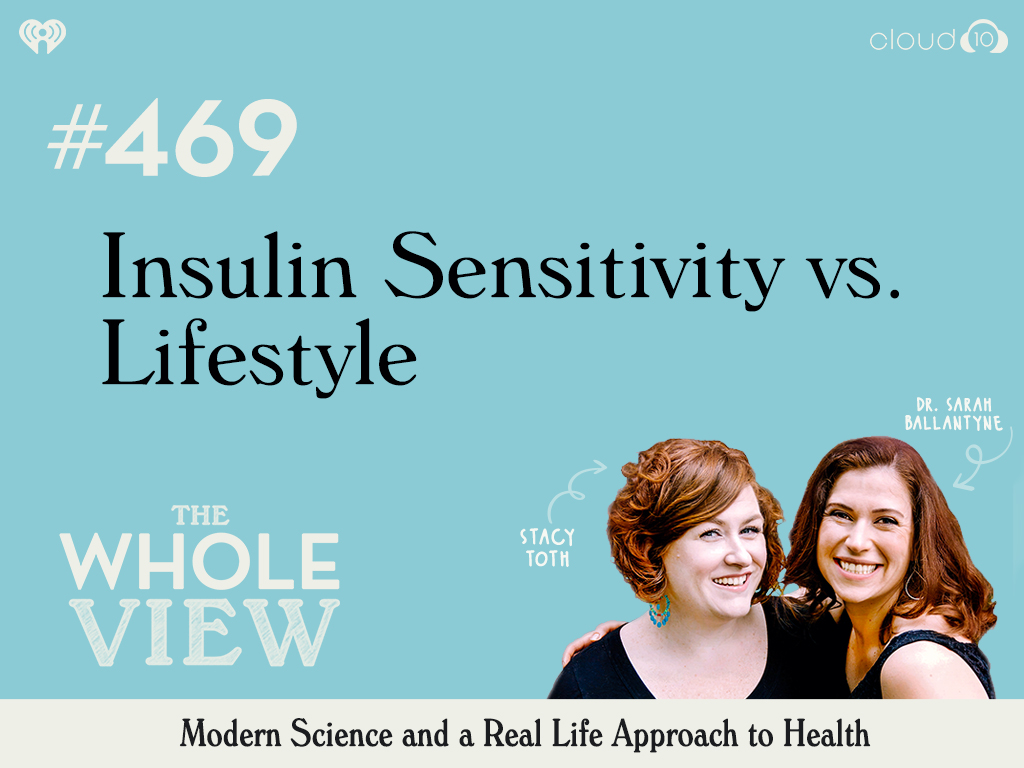
Welcome to episode 469 of The Whole View! This week, Stacy and Dr. Sarah examine insulin sensitivity vs. lifestyle to see how diet, exercise, stress, and sleep can play a factor.
If you enjoy the show, please review it on iTunes!
The Whole View, Episode 469: Insulin Sensitivity vs. Lifestyle
Welcome back to episode 469! (0:28)
Not long ago in Episode 467, Stacy and Dr. Sarah talked about how moderate sugar can fit into a healthy diet.
One aspect of that conversation not fully explored was how lifestyle factors influence insulin sensitivity and regulation.
Blood sugar is tangential to many of the topics Dr. Sarah and Stacy talk about on this show.
Why Care About Insulin?
The body produces insulin inside beta cells in the islet of Langerhans in the pancreas and stores Insulin in insulin granules until serum glucose levels increase. (8:40)
Our blood sugar increases when we consume carbohydrates.
That rise in glucose stimulates insulin release by the pancreatic β-cell through ATP-sensitive K+ channel (KATPchannel)-dependent and -independent signaling pathways (1–3).
The insulin then facilitates the transport of glucose into the body’s cells (via GLUT4) and signals to the liver to convert glucose into glycogen and triglycerides for storage.
Chronically elevated blood sugar levels stimulate adaptations within cells, rendering them less sensitive to insulin.
These adaptations may include decreasing the number of receptors to insulin embedded within the cell membranes and suppressing the signaling within the cell that occurs after insulin binds to its receptor that stimulates translocation of GLUT4.
This causes the pancreas to secrete more insulin to lower the elevated blood glucose levels. When the body requires more insulin than normal to deal with blood glucose, it’s called insulin resistance or loss of insulin sensitivity.
When blood sugar levels can no longer be maintained in a normal range (due to the pancreas being unable to keep up with insulin demand and/or substantial loss or inhibition of insulin receptors in cells), you get type 2 diabetes.
Quick Recap: Episode 467:
- High blood sugar levels after eating are a major stimulator of reactive oxygen species (ROS), which are chemically reactive molecules that have important roles in cell signaling (the complex communication between and within cells) and in homeostasis (maintenance of a stable environment inside and outside the cell).
- But ROS are also potent signals for inflammation, stimulate proinflammatory cytokines (chemical messengers), and injure cells and tissue.
- We produce more ROS after eating carbohydrates when we’re insulin resistant.
- As a result, chronic high blood sugar levels can cause serious damage throughout the body, including to blood vessels and vital organs.
- This is why diabetes (chronic hyperglycemia) is associated with a higher risk of stroke and other thromboses, cardiovascular disease, vision problems, kidney disease, and nerve damage.
- For more, see https://www.ncbi.nlm.nih.gov/pmc/articles/PMC3608918/
Stacy and Dr. Sarah talked about the non-metabolic roles of insulin in TPV Podcast, Episode 305: Why Insulin Is Important & Awesome! It’s a super important episode, so make sure to check it out!
They also reference The Case for More Carbs: Insulin’s NonMetabolic Roles in the Human Body for even more reading.
Insulin Sensitivity vs. Lifestyle in Terms of Diet
But, it’s not just about how much sugar you consume or whether that sugar is fast-burning or slow-burning.
It’s theorized deficiencies of vitamins and minerals involved in glucose metabolism and insulin signaling (which include vitamin D, chromium, biotin, vitamin B1, and vitamin C) underlie diabetes.
Risk of type 2 diabetes decreases with increased intake of:
- Vitamins B3, B6, B9, B12, & D
- Chromium
- Calcium
- Magnesium
- Zinc
- Inositol
- Alpha-lipoic acid
- Omega-3 fats
- Carnitine
- Fiber
However, there’s emerging evidence that lifestyle factors may be equally or perhaps even more important than dietary choices regarding insulin sensitivity.
Insulin Sensitivity vs. Lifestyle in Terms of Exercise
Physical activity provides a wide range of benefits, from improving bone density to cardiovascular health to metabolic health. (18:30)
Exercise helps improve insulin sensitivity through a direct action on the glucose transport molecules (GLUT-4 receptors) in the individual cells of our muscles.
It also affects the full range of hormones related to accessing stored energy and regulating its use.
This “boost” in metabolism is one reason why exercising can make us feel more energetic throughout the day.
This is also a major reason exercise is linked with a reduced risk of diabetes and cardiovascular disease.
Inactivity Risk
On the flip side, sedentary behavior itself can actually induce insulin resistance.
A series of studies performed in healthy adults, overweight and obese adults, and athletes have shown that even a relatively short period of inactivity (for example, 3-days bed rest due to injury, illness, or volunteering for a clinical trial) induces insulin resistance.
A 1998 study in highly trained endurance athletes shows a 65% increase in insulin secretion following a glucose challenge test after 7-10 days of bed rest.
A 2007 study in healthy adults showed a 67% increase in insulin secretion following a glucose challenge test following 5-days of bed rest.
And, this inactivity-induced insulin resistance is paired with dyslipidemia, increased blood pressure, and impaired microvascular function.
No wonder being inactive so dramatically increases the risk of diabetes, obesity, and cardiovascular disease.
The effect may also be worse when paired with a poor diet. For example, a 2019 study compared a hospital diet to a legume-based low GI diet. The results showed that the latter was able to prevent insulin resistance from bed rest partially.
So, while exercise itself improves insulin sensitivity, we still need to avoid prolonged periods of inactivity, like sitting at a desk job.
What Can We Do?
Fortunately, even short activity breaks regularly spaced throughout sedentary periods can dramatically improve glucose metabolism. ()
A 2021 study in overweight and obese adults showed that 2-minute movement breaks every 20 minutes of sitting time substantially lowered post-meal glucose and insulin levels.
What does this mean? It’s important to include regular exercise into our routines and avoid prolonged periods of inactivity to regulate insulin sensitivity.
- Arciero PJ, et al., Effects of short-term inactivity on glucose tolerance, energy expenditure, and blood flow in trained subjects. J Appl Physiol. 1998;84:1365–1373.
- Dunstan DW et al. Breaking Up Prolonged Sitting Reduces Postprandial Glucose and Insulin ResponsesDiabetes Care. 2012 May; 35(5): 976–983.
- Hamburg, NM et al., Physical Inactivity Rapidly Induces Insulin Resistance and Microvascular Dysfunction in Healthy Volunteers. Arterioscler Thromb Vasc Biol. 2007 Dec; 27(12): 2650–2656.
- Gao R, Duff W, Chizen D, Zello GA, Chilibeck PD. The Effect of a Low Glycemic Index Pulse-Based Diet on Insulin Sensitivity, Insulin Resistance, Bone Resorption and Cardiovascular Risk Factors during Bed Rest.Nutrients. 2019 Aug 27;11(9):2012. DOI: 10.3390/nu11092012.
Insulin Sensitivity vs. Lifestyle in Terms of Stress
Psychological stress causes the release of both catecholamines (via activation of the sympathetic nervous system) and glucocorticoids (via activation of the hypothalamic-pituitary-adrenal [HPA] axis). (29:25)
The combined actions of catecholamines and glucocorticoids like cortisol (as well as a corticotropin-releasing hormone secreted upon activation of the HPA axis) prioritize the essential functions for survival.
They also inhibit non-essential functions, like some aspects of the immune system, especially in the skin, digestion, kidney function, reproductive functions, growth, collagen formation, amino acid uptake by muscle, protein synthesis, and bone formation.
This is beneficial in the case of acute stress (from a survival standpoint) and is also why chronic stress is so detrimental to immune and metabolic health.
Dangers of Chronic Stress
Chronic stress causes insulin resistance, mediated directly via cortisol and indirectly via increased inflammation that is also a feature of chronic stress.
Many researchers have proposed that chronic stress may be a dominant contributor to the pathogenesis of metabolic syndrome, that nasty combination of obesity, insulin resistance and/or type 2 diabetes, dyslipidemia and hypertension.
Epidemiological studies linking chronic stress with insulin resistance are now supported by mechanistic studies showing that chronically elevated cortisol is diabetogenic, meaning it can cause diabetes.
Cortisol suppresses insulin secretion from pancreatic beta cells and impairs insulin-mediated glucose uptake in cells throughout the body (by inhibiting GLUT-4 translocation into the cell membrane and disrupting insulin signaling in muscle tissue.
In addition, a growing list of inflammatory cytokines, such as TNF-α, which is induced by chronic stress, is known to cause insulin resistance.
Role of Acute Stress
Recent evidence shows that even acute stress causes hyperglycemia and insulin resistance. ()
Acute stress impairs liver insulin signaling independent of cortisol. Plus, cortisol acutely suppresses insulin secretion by the pancreas and increases glucose output by the liver.
What does this mean? Both acute and chronic stress can directly cause insulin resistance independent of diet, mitigating stress and improving resilience to stress as a primary target for blood sugar regulation.
For more reading, check out:
- Glovatchcka, V, et al., Chronic stress-induced changes in proinflammatory cytokines and spinal glia markers in the rat: a time-course study. Neuroimmunomodulation. 2012; 19(6): 367–376.
- Lambillotte C, et al., 1997 Direct glucocorticoid inhibition of insulin secretion. An in vitro study of dexamethasone effects in mouse islets. J Clin Invest 99:414–423
- Li L, et al., Acute psychological stress results in the rapid development of insulin resistance. J Endocrinol. 2013 Apr 15;217(2):175-84. doi: 10.1530/JOE-12-0559. Print 2013 May.
- Rosmond R 2003 Stress-induced disturbances of the HPA axis: a pathway to Type 2 diabetes? Med Sci Monit 9:RA35–RA39
- Tamashiro KL, et al., Chronic stress, metabolism, and metabolic syndrome. Stress. 2011;14:468–474
- Van Raalte DH, et al., 2009 Novel insights into glucocorticoid-mediated diabetogenic effects: towards the expansion of therapeutic options? Eur J Clin Invest 39:81–93
Insulin Sensitivity vs. Lifestyle in Terms of Sleep
Only about 35% of Americans get the recommended 8 hours or more of sleep each night. (40:41)
The health detriments of inadequate sleep are pervasive, affecting every system in the human body and increased the risk of nearly every chronic disease, including type 2 diabetes and insulin resistance.
In fact, sleeping less than 6 hours per night (like an estimated 40% of Americans) increases the risk of type 2 diabetes by 50%.
And, if we pool diabetes and impaired glucose tolerance together, that risk soars to a whopping 2.4 times!
Additional Resources:
- Chaput JP, et al. “Sleep duration as a risk factor for the development of type 2 diabetes or impaired glucose tolerance: analyses of the Quebec Family Study.” Sleep Med. 2009 Sep;10(8):919-24. doi: 10.1016/j.sleep.2008.09.016. Epub 2009 Mar 29.
- Gangwisch JE, et al. “Sleep duration as a risk factor for diabetes incidence in a large U.S. sample.” Sleep. 2007 Dec;30(12):1667-73.
- Yaggi HK, et al. “Sleep duration as a risk factor for the development of type 2 diabetes.” Diabetes Care. 2006 Mar;29(3):657-61.
In fact, a variety of studies evaluating the effects of partial sleep (sleeping 4 to 5 hours per night, rather than the recommended 8) demonstrate that inadequate sleep causes insulin resistance in healthy people.
And while most studies show insulin sensitivity decreasing by 15-30% after four or five nights of partial sleep,
Dr. Sarah recommends Influence of partial sleep deprivation on energy balance and insulin sensitivity in healthy women and Impaired insulin signaling in human adipocytes after experimental sleep restriction: a randomized, crossover study for more.
The Science on Sleep
A 2010 study showed that even a single night of partial sleep causes insulin resistance in healthy men and women (a 25% decrease in insulin sensitivity!).
Sleep restriction also increases the measurable free fatty acids in the blood, a contributor to insulin resistance that plays a central role in developing metabolic diseases.
Getting 4.5 hours of sleep per night compared to spending 8.5 hours in bed increased serum free fatty acids in healthy men by 15 to 30 percent!
What’s even more fascinating is that there’s emerging evidence that the impact of sleep on insulin sensitivity and glucose metabolism is even greater than a diet.
This study examined the effects of one night of total sleep deprivation on insulin sensitivity and beta-cell function, as assessed by an IVGTT, before and after 9 months of high-fat feeding in a canine model.
One night of total sleep deprivation in lean dogs impaired insulin sensitivity to a similar degree as a chronic high-fat diet (HFD). One night of sleep deprivation lowered insulin sensitivity MORE than 9 months of a high-fat diet!
After chronic high-fat feeding, acute total sleep deprivation did not cause further impairments in insulin sensitivity. A bad diet did not make insulin resistance caused by lack of sleep worse.
The findings further prove that sleep is important for metabolic health and establish a diurnal animal model of metabolic disruption during insufficient sleep.
Get Enough Sleep!
Even a modest sleep debt, getting a mere 30 minutes less per night than you need on weeknights, can greatly impact insulin sensitivity.
One fascinating study looked at the impact of sleep on patients newly diagnosed with type 2 diabetes.
The study participants kept sleep logs. The researchers calculated how much less sleep they got than the recommended 8 hours a night cumulative over the workweek (not including sleeping in to “catch up on sleep” on the weekends).
They were randomized into three groups: usual care, physical activity intervention, or diet and physical activity intervention.
When the participants were recruited, those that typically didn’t get enough sleep were 72% more likely to be obese. The researchers then followed the participants over a year to see what would change.
Note that addressing sleep was not part of any of the study interventions. The amount of sleep debt that individuals had didn’t typically change during the study.
Sleep debt dramatically impacted the risk of obesity and insulin resistance, and the correlation between the two increased throughout the study.
For every 30 minutes of weekday sleep debt, the risk of obesity and IR at 12 months increased by 18% and 41%, respectively.
Keeping to a consistent schedule is also super important! Getting adequate sleep every single night is critical for insulin sensitivity and blood sugar regulation!
Sleep and Stress Correlation
Given that inadequate sleep is considered a cause of chronic stress, that emphasizes the need to carve out sufficient time for sleep even more!
- Rao MN, et al., Subchronic sleep restriction causes tissue-specific insulin resistance. J Clin Endocrinol Metab. 2015 Apr;100(4):1664-71.
- 5 nights of 4 hours sleep
- Insulin sensitivity decreased by 25%
- Cortisol increased by 21%
- Lucassen EA, et al., Interacting epidemics? Sleep curtailment, insulin resistance, and obesity, Ann N Y Acad Sci. 2012 Aug;1264(1):110-34
Final Thoughts
We invite you to subscribe to this channel and the realeverything.com and thepaleomom.com blogs and newsletters.
If you haven’t joined the Patreon family yet, head over for exclusive behind-the-scenes content about how Stacy and Sarah really feel about the topics they discuss. Your subscription goes to support this show and gets you direct access to Stacy and Sarah.
Thank you so much for listening, and we’ll see you next week!
Want more info on our Real Life? Healthy recipes, parenting tips, and general lifestyle stuff goes out in our Real Everything newsletter, join here.
Never want to miss a post, sale, or deal? Join my Healthy Inside & Out e-mail list for more info on non-toxic living and safer skincare!





